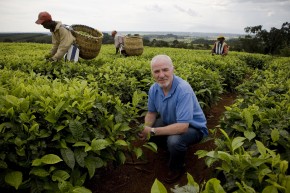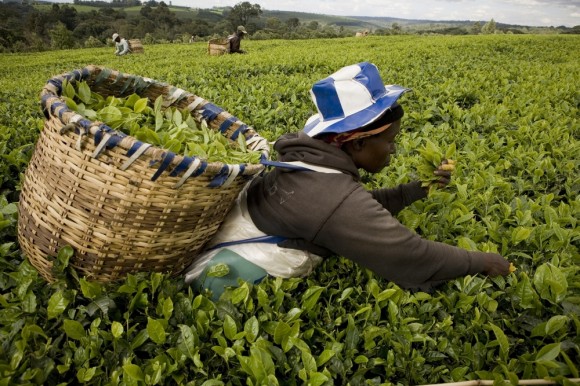Towards the end of last year, I was privileged to visit Africa with Harriet Lamb, Executive Director of the Fairtrade Foundation, to see for myself the benefits Fairtrade is bringing to growers and their families in South Africa and Kenya.

In Kericho, Kenya, I met people who are being offered hope and incentives by an ambitious three-year, ‘co-operative-to-co-operative’ trade development project, called ‘Kibagenge’ – which means ‘coming together as one’ in the local language. People like Mercy Maritim – a widow who simply wants to provide an education for her young children.
Dignified and vivacious despite her circumstances, Mercy had dressed in her “Sunday best” to see us and was proud to show us round her home - a traditional earth-walled structure with a tin roof. She lives there with her extended family, including her elderly mother, who she is also supporting. Mercy showed us her small vegetable plot and her kitchen garden, which the Kibagenge project has encouraged smallholders to start so they can grow items to help feed their families.
The project was originally intended to benefit the 8,000 smallholder tea farmers whose livelihoods were threatened by the instability of tea prices by giving them collective bargaining power and leverage through the development of producer co-operatives. However, word about the opportunities the project could offer soon spread, and over 11,000 farmers have now formed five co-operatives, overseen by a single federation. The project has been match-funded by the DFID Food Retail Industry Challenge (FRICH) Fund, and is being delivered in partnership with The Co-operative Group; tea supplier, Finlays; the charity Africa Now!; and the Co-operative College in the UK and Kenya.
This trip opened my eyes. I really didn't ‘get it’ enough until I went there and saw the desperate poverty that these hard-working and proud people are enduring. But Fairtrade is about helping growers trade their way out of poverty by helping them become self-sufficient and sustainable in the long run. The proud people I saw on my brief visit want our support through trade, not aid.

Of course, the current drought and food crisis in Kenya means millions of people there are in need of help now. But the best way to help Africa in the long term is not just with food handouts, it is by supporting economic growth. With the greater economic prosperity this will bring, more people will have the resources to cope with such disasters in the future.
In the midst of the drought, it is easy to forget the progress being made elsewhere in the country, but steps forward are being made.
Later this summer, the 11,000 Kenyan smallholders are set to receive a visit that could further transform their lives and those of their families. They will be visited by the Fairtrade Labelling Organisation, with the hope that, by the end of the summer, they will be certified to supply the growing Fairtrade market.
Fairtrade is about ploughing more profits back into the communities that have grown the products which have helped generate them in the first place. It's a great example of how businesses can be socially responsible: rather than just looking at wealth creation for its own sake, it’s about using the wealth generated to put something back.
By forming into co-operatives, Kericho farmers like Mercy have benefited in many ways, including having a stronger voice in trading negotiations and enjoying improved access to markets. They can also build a business they own and in which they will share the profits. Fairtrade certification will guarantee a minimum price for their tea and enable them to supply into The Co-operative’s ‘99’ Fairtrade tea blend, as well as other retailers in the longer term.
Despite these tough economic times, sales of Fairtrade products in the UK, which cover everything from cotton wool to wine, and from carrier bags to chocolate, have remained strong. That may be surprising to some, because, in a recession, you might think people would be more concerned about price than fairness. But we have found our members and customers are more concerned with ethics - they don't just ignore their values and principles because there is a recession on.
Whilst in the UK there are a few retailers that embrace Fairtrade with authority, there are many that don't. It would be great if those retailers actually welcomed Fairtrade enthusiastically, by sourcing from existing Fairtrade suppliers and by taking advantage of international development funding to bring more farmers into the Fairtrade system, or by supporting other development projects.
Visiting Africa was a fantastic opportunity for me – going out there to see the contribution that Fairtrade makes to people's lives. It would be great if it was the norm in a few years’ time and that's what we should all aim for.
Watch a video about Peter's visit
See how UK aid is changing the lives of the world's poorest people. Hear the stories, follow our progress and tell your friends
Please note, this is a guest blog. Views expressed here do not necessarily represent the views of DFID or have the support of the British Government.

2 comments
Comment by Tricia Atherton posted on
I agree, Peter, Africa needs a fair chance at the global market, not handouts.
Here in Rwanda people work incredibly hard, particularly primary school teachers who often walk for an hour and a half to get to school for 7am start and have two shifts of children , one in the morning and one in the afternoon. They finish classes at 5pm and walk home to feed their family. They get paid so little that they also have to grow their own food and sell whatever they can to make ends meet. They spend any spare time cultivating the land, including growing tea and coffee. The Co-operative system is the only way (and the best way) for them to get their products on the market.
Thank you to all the great Co-operative workers under the sun!! - and in the rain too!!
Comment by Stephen Chelule posted on
I was excited to read the benefits that we small scale tea farmers can get from fairtrade.I wish to get in touch with fairtrade officials in Kericho because we also have a Kibagenge of small scale tea farmers in Bureti in Kericho
county and want to sell our tea through fairtrade.